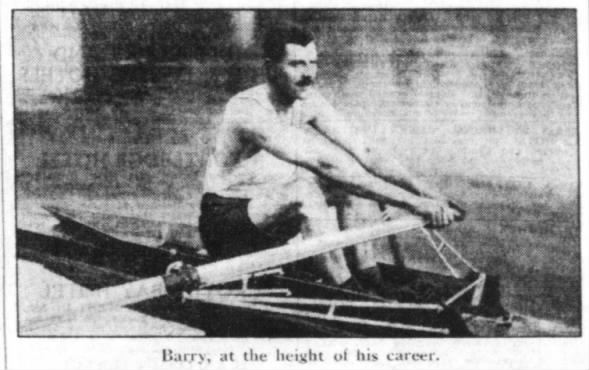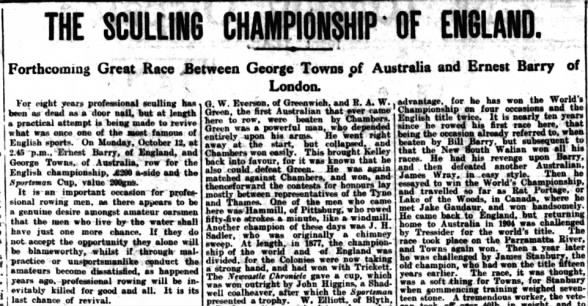In part I of our blog, we learned about the ancient English ceremony of ‘landing the pie’, which was revived in 1923. But who was Ernest Barry, the man upon whom the privilege of landing the pie fell during that Saturday in May 1923?
 Ernest Barry 15 Feb 1963, Fri The Daily Telegraph (London, Greater London, England) Newspapers.com
Ernest Barry 15 Feb 1963, Fri The Daily Telegraph (London, Greater London, England) Newspapers.com
Ernest was born near Victoria Dock in London on 12 February 1882 and is said to have been taught to row by his brother, Bill Barry, a former sculling champion of England. In 1903 he won Doggett’s Coat and Badge, a historic rowing race held on the River Thames. Established in 1715, it was, and still is, contested by apprentice watermen and lightermen.
Prior to entering into strict training, Ernest was employed at Billingsgate Market. Work that sometimes occasioned his pulling a barge and regular hours kept him particularly fit. A significant moment in Ernest’s career came in 1908 when he beat George Towns of Australia for the English Championship and Challenge Cup, which the former had held since 1900. By beating Towns, Ernest set a record time for the Putney-Mortlake course, which was still standing when he died.
 13 Sep 1908, Sun The Weekly Dispatch (London, London, England) Newspapers.com
13 Sep 1908, Sun The Weekly Dispatch (London, London, England) Newspapers.com
In 1910, Ernest competed, for the first time, in the World Professional sculling championship on the Zambezi River, in what was then Northern Rhodesia. He lost, but he would soon be back to challenge for the title again. Undeterred, in 1912, Ernest won the world championship on the River Thames, beating New Zealander Richard Arnst. A formidable champion, he would go on to win the title five times between 1912 and 1920.
In later life, Ernest became a rowing coach, with success in Denmark and Germany. He also served as King’s Bargemaster to King George VI, which entitled him to ride on one of the coaches – not the royal coach itself – at the opening of parliament. He retired from the post in 1952 due to ill health. Ernest lived to see the end of professional sculling and was sadly forced to sell all but two of his trophies to help support himself and his family. Ernest lived at Twickenham (southwest London), only yards from the Thames, where he rowed to some of his finest achievements, sometimes defending his titles before crowds approaching 150,000.
‘…traditionally known as the world’s greatest ever sculler’: these were the words used by the Middlesex Chronicle when our champion sculler and pie-bearer died in 1968 at the age of 86.
 02 Aug 1968, Fri Middlesex Chronicle (Twickenham and Whitton ed.) (Hounslow, London, England) Newspapers.com
02 Aug 1968, Fri Middlesex Chronicle (Twickenham and Whitton ed.) (Hounslow, London, England) Newspapers.com
According to Ernest’s obituary in The Telegraph:
‘It is singularly appropriate that he will be buried today at Mortlake, the finishing post for so many of his famous victories.’
Find more articles about Ernest Barry & Landing the Pie on Newspapers.com™. And follow us on Facebook, X (Twitter), Instagram, Threads, and TikTok for more content like this!
Sources
St Margarets Community Website, Some Ins and Outs on Eels, accessed October 2023.
Twickenham Museum, Ernest Barry, accessed October 2023.


(Musical notes) $Do you hear what I hear? Oregon is a calling! It hasn’t been checked in yeeaaaaaaaaaarrrrrrrsssssss!$